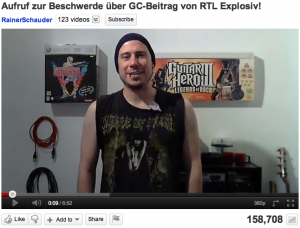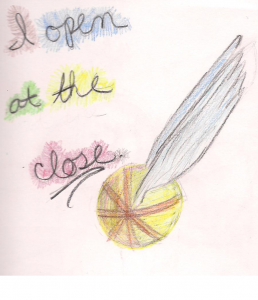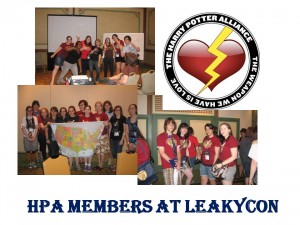For the last two days I’ve been following a very interesting and most of all rapid form of civic engagement amongst the gamer community in Germany. I first heard about it from my brother back home, who is a gamer and sent me a link to a video that sparked a tremendous outrage online, particularly on YouTube. The content of the video is a short “news report” on the gamescom (game convention and exhibition in Cologne last weekend) from the current affairs show ‘explosiv’ on RTL, one of the two leading German broadcast TV stations (German cable is virtually non-existent). In the report gamers are portrayed as a bunch of male, alcoholic and crazed weirdoes who have a terrible body hygiene and no romantic relationships.
You can find a subtitled version here:
http://kotaku.com/5834290/this-german-booth-babe-is-judging-you
(I hope this video hasn’t been taken down when you are accessing it; banning YouTube videos has been RTL’s crisis strategy, it seems).
First shown on air last Friday, August 19th, the video immediately
went viral amongst gamers, and when leading gamer and YouTuber Rainer
Schauder came back from gamescom Tuesday this week (August 23rd) and
finally saw the video himself, he took to his YouTube channel (link in German) to not
rant against the TV station (like so many other gamers had at first),
but to encourage all other gamers to go to programmbeschwerde.de (link in German),
Germany’s official TV complaints website, and to launch a formal
complaint against RTL and the ‘explosiv’ report.
Schauder explicitly asked his viewers to abstain from any derogatory remarks against RTL or the video, and to clearly and objectively explain in the complaint comment section how this report discriminates against gamers and breaches several broadcasting laws and codes of ethics. Schauder uploaded this video at 4am on Wednesday (August 24th) morning (EST+1 /
German time).
According to a second (link in German) video Schauder uploaded about 12 hours later, even he himself would never have imagined the immense and immediate response to his video, which of course also went viral. Thousands of gamers all over Germany took first to the TV complaint website to lodge their official complaints, and then created their own (link in German) YouTube videos sharing their objective and to-the-point messages they used in the complaint comment section. Many went so far as to cite broadcast laws and regulations in detail (chapter and paragraph numbers). By 9am on Thursday morning (August 25th), programmbeschwerde.de had broken down several times due to its extreme website traffic, and a total of 6.500 complaints (link in German) had been submitted. At the moment the website is back up again, with a request to not submit any more RTL/’explosiv’- related complaints as the Complaints Commission is already looking into it. In addition, a video (link in German) has surfaced on several YouTube pages and website that claims to be an official message from the hacker group Anonymous, with a threat to take RTL down due to its sensationalist practices that lack any journalistic integrity (this is not the first time RTL’s ‘news programs’ have been questionable). However, it has been questioned whether this video is real (i.e. indeed authored by Anonymous).
While RTL and the show ‘explosive’ have a website, Facebook pages, and Twitter accounts, it took until noon on Thursday, August 24th 2011, that RTL issued an official apology, as a press release and as a video on their website. The producer of the show also posted on the gamescom facebook page saying that the report was meant to be comedic and ironic, and that he apologizes “should he have insulted the feelings of anyone.”
However, it seems that these apologies aren’t enough for the gamers – and I cannot blame them. The wording of the apologies is formulaic and insincere at best, and so the gamers are demanding a broadcast apology with an actual effort on RTL’s behalf to show the diversity amongst the gamer community and to eliminate the prejudices the producers established in their original report. It is late Thursday evening in Germany now, so I’m waiting to see what will happen tomorrow, but I think this whole situation is an excellent example how youths can use their shared media culture to organize quickly and efficiently, and to
bring about real-life and even actual legal action.
Update (Aug 25 2011, PM): Rainer Schauder just uploaded his “final” video for his cause, thanking the gamers for taking such great action and asking them to now stop complaining and the let Complaints Commissioners do their job. He also doesn’t want anyone to keep ranting about RTL and particularly doesn’t want them to continue to throw swear-words at the station and its show. Lastly, he makes it clear that he doesn’t want to be seen as a ‘Michael Moore’ of the gamer community, and just wants to continue living his normal life.
Update (Aug 26 2011, AM): The Complaints Commission decided (link in German) that RTL’s ‘explosiv’ report did not violate any rules and regulations of German broadcasting and was protected by freedom of expression/opinion, but did agree that the nature and tone of the program was “irksome” and that the outrage surrounding it as well as RTL’s apology were justified. The gamers’ reaction was one of acceptance with underlying contentment; even if RTL is not facing any legal consequences, it seems that the gamers are happy to have a) shown RTL (and the entire country) that they are a large societal group to be reckoned with, and to have b) seen that they are in fact capable to quickly organize themselves to take effective action. I for my part will be interested to see whether this self-organization will continue, given that the gaming community in Germany is still facing many prejudices and scape-goating, particularly when it comes to violence among youths.




